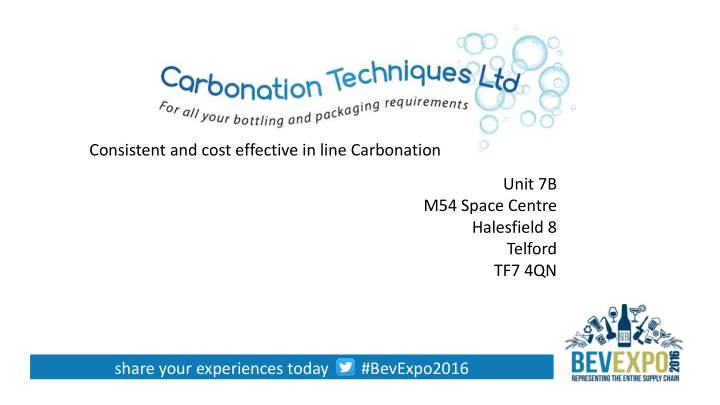

Consistent and cost effective in line Carbonation Unit 7B M54 Space Centre Halesfield 8 Telford TF7 4QN share your experiences today #BevExpo2016
Introduction to Carbonation Techniques Ltd • In excess of thirty five years world wide experience with bottling and packaging machinery. • With knowledge gained, this enabled us to develop precise and economical carbonation systems that are individually designed to suit each customer’s preference and product alike. • Cradle to grave approach. • Design and manufacturing at our Telford factory. On site installation and commissioning by the same team. • Positive working relationships with customers and suppliers. Individual and specific projects undertaken. Customer’s specifications accommodated and integration into factory process manufacturing management systems, as required. share your experiences today #BevExpo2016
What we do • Design:- Each machine is individually designed to suit process and production requirements, giving consistent carbonation from the first drop until the last without any fluctuation. • Manufacture:- Carbonation systems range from 200 to 60,000 litres per hour. Pre mix carbonation systems, mixed gas carbonators for beer and premix blending units. All built in house at our Telford factory. • CIP:- Specific and tailor made to customer’s exact requirements. • Engineering Services :- On site surveys. Turnkey projects working with Industry partners, Eurostar srl for bottling and can filling equipment and Enoveneta srl for keg and process filling machinery. share your experiences today #BevExpo2016
How’s it done? In this instance, we’ll look at beer: • The beer is delivered directly from the bright beer tanks, into its own stainless steel and glass receiver vessel, which contains level management systems. • The beer is then pumped from this vessel via the progressive cavity pump system, ensuring continuous gentle handling of the product. • The beer enters the carbonating pressure vessel, which contains its own level control system. • Product temperature is closely monitored by its own controller, which changes C02 volumes according to temperature change. This gives continuity of C02 within the product. • During carbonation, de-aeration is carried out, removing any air / oxygen contained in the beer. • A over pressure pump is installed at the product outlet, giving extra control with difficult beers when fobbing occurs during filling. • The over pressure pump is utilised for transfer of cleaning medium to the filling machine . • Normal operating temperature up to 8 degrees C for beer. Cider ambient. share your experiences today #BevExpo2016
How’s it done? In this instance, we’ll look at beer: share your experiences today #BevExpo2016 share your experiences today #bevexpo
Environmentally friendly specifications • Lower filling pressures. • Lower power consumption. • Lower C02 pressures, giving less C02 wastage at filler snift operation resulting in less bottle fobbing. • Fewer bottle explosions which reduces machine stoppages and product losses. • Efficient use of C02. • Overall greater efficiency. • Cost effective. share your experiences today #BevExpo2016
Cost comparison analysis Existing O&H Intermix carbonation system with a production capacity of 18,000 litres per hour. Documentation shows a figure of 13.7kw/electricity usage. Cost of electricity = £0.0715 per kw. 13.7 x £0.0715 = £0.98 per hour x 8 = £7.84 per shift. 5 shifts per week at £7.84 = £39.20 x 48 working weeks per year = £1881.6. Example: Carbo 30,000 PreMix – Using installed power figures 10.0kw/electricity usage. 10 x £0.0715 = £0.715 per hour x 8 = £5.72 per shift. 5 shifts per week at £5.72 = £28.60 x 48 working weeks per year = £1372.80 with 88.8% more production capacity. Regarding C02: This is far more difficult to calculate owing to production and atmospheric losses, but given the carbonation efficiencies and process improvements, savings will be made. share your experiences today #BevExpo2016
Who’s doing what and where? Scotland and Cumbria Key Beer Cider Soft Drinks Alcopops Water Wine share your experiences today #BevExpo2016
Who’s doing what and where? Southern England and Key Wales Beer Cider Soft Drinks Alcopops Water Wine share your experiences today #BevExpo2016
Sample Selection share your experiences today #BevExpo2016
Photographs 4,000 Litre Per Hour Carbonator 2 x 2,000 Litre Per Hour Carbonator 2,000 Litre Per Hour Mixed-Gas Carbonator 14,000 Litre Per Hour Carbonator 200 Litre Per Hour Carbonator 10,000 LPH PreMix Unit share your experiences today #BevExpo2016
Recommend
More recommend